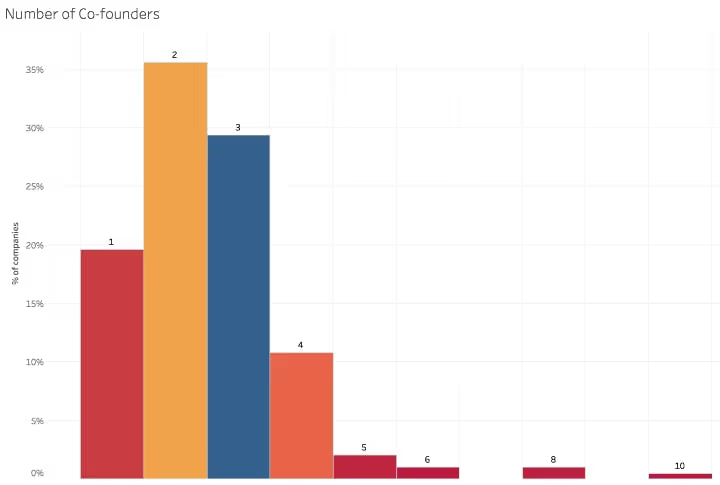Many entrepreneurs have incredible visions, but converting that vision into a successful startup often relies on finding the right co-founder, or co-founders. For one thing early-stage investors will look at your team before your idea, and secondly, co-founder(s) will be invaluable as a complement and contrast to your own skill sets as you start to build the business.
Often, finding the ideal co-founder relies heavily on your capacity for introspection and to spot talent that differs from yours. For example, Gordon Moore found in Robert Noyce an avid technologist that could bring his creative vision, Intel, to life. Larry Page and Sergey Brin were famously at odds with one another at the start of their doctoral degree, until being pushed together for a project (where they found out they worked rather well together), and we have that moment to thank for Google.
Most dramatically, Mark Zuckerberg ended things with the Winklevoss Brothers on such bad terms that it was turned into a Hollywood movie. Yet, without the Winklevoss’ idea of building a proper social media platform, Zuckerberg may well have never graduated beyond his classmate rating programme.
What does it mean to be a co-founder?
Co-founders are the first people in the trenches for any start-up, taking the idea and turning it into a commercially viable business. In many cases they are present at the very genesis—the “big bang” idea that comes from the founder—though that’s not always the case. They might be brought on as the founder starts to build on their idea.
Not everyone that is present the moment the idea is formed becomes a co-founder, either. A co-founder has characteristics above and beyond simply being present or “a first hire.” A good rule of thumb here is that the co-founder must have taken some of the risk of the business failing before they can claim credit for its success. A co-founder needs to put skin in the game, and that often means investing substantial time and/or money.
The value of a co-founder team
It's often said that an effective startup requires three key roles: A visionary, a hacker and a hustler. The visionary has the big idea and can see the future potential of the company. The hacker is technically skilled and can build the product or service. And lastly, the hustler is great at selling and getting things done.
As a founder, you're going to be at least one of these. Often two. However, it’s very unlikely that you will be equally capable across all three. This is why going solo is often so difficult, and why building a startup up as a team is a preferable approach. Having a co-founder helps the startup have access across the three roles that it needs.
While there are three roles, that does not necessarily mean that you need a team of three co-founders. Two co-founders that between them have those capabilities is common. As long as the skill sets overlap and complement each other in the right way between you, you’ve got the capabilities and the credentials to be a success.
How many co-founders should a startup have?
Generally speaking a successful startup will have a team of two or three people running the show. It is possible for a startup to be successful as a solo project, though for all the reasons mentioned above most founders realize the benefits of finding at least one co-founder.
A leadership team of four or more, meanwhile, can become problematic. The reason for this is not that it’s a case of “too many cooks,” to use the old proverb. Rather, what often happens when you start getting four, five or more co-founders is that at least one or two of them start to feel sidelined within the startup, and that can cause leadership friction, which can be incredibly damaging in the early stages.
Though there is no right or wrong answer and it will always come down to the competencies, ideas, and dynamics within the team, a successful startup leadership team will usually have one or two co-founders.

Co-founder matching: How to choose the right co-founder?
One hugely important thing to remember when finding a co-founder is that this is a long-haul relationship and therefore personal compatibility is important. In best case scenarios, founders will be working together for the next 7-10 years. To put this into perspective, that is longer than the average length of marriage in the US!
If you’ve got the most competent person you can imagine as your co-founder, but you can’t stand to be in the same room as them after the first year, your startup will be in trouble. Here are some of the steps you can take when talking to a potential co-founder to determine whether the right compatibility is there.
1) Sit down and put everything on the table
It’s important that each person understand what your goals are, both personally and professionally, where you want this startup to take you, and what it is about entrepreneurship that drives you. Ask questions like:
- Where do you see yourself in five and ten years?
- What are your personal goals?
- What are your values–what do you think makes a good business and how would you lead that?
- What, ultimately, motivates you and what do you define success as?
- Why are you interested in this idea and what do you want to do with it?
You don’t need to share the exact same goals, but you do need to be headed in the same direction.
2) Write a job description
This isn’t something to post on LinkedIn or any other job platform, but it is a useful exercise to help crystallize in your mind what you need in your co-founder. Write the job description as you would for a real ad being posted, considering all the qualities that you’ll need or don’t want, and use this to help draw a picture of what your ideal co-founder’s profile would be.
3) Write a list of the skills you lack
Now it’s time to be brutally truthful of yourself—what are you not good at?
Do you struggle with organizational discipline? Are you an introvert and therefore not comfortable being in the limelight? Would you benefit from having someone with a more technical understanding of IT working with you?
Understanding where your weaknesses are can help you decide what qualities you need in your co-founder, and if you’re not sure about your own personality profile, consider taking a personality test to get a more objective look at yourself.
4) How do you like to work?
If you’re one of those people that likes to work late but give yourselves the mornings, then an early riser could either be the perfect co-founder, or your very different work styles could become a source of conflict. If you’re one that likes to leave the computer firmly off at the end of the day, and your co-founder would prefer to be able to contact you out of hours, then you will need to discuss how that dynamic will work.
It's relatively easy to define the skills compatibility between you and your co-founder or co-founders. Whether there’s the right “cultural fit” depends more on your personality matching, and that’s a softer and more difficult thing to define. The best approach is to have frank and honest discussions up-front.
4) Can we get to 100k in revenue on our own?
Consider the skills that you and your prospective co-founder or co-founders have. There will probably still be some gaps on the nice-to-have list, but have you, between you, got the core skills that you need to get the business started? A good rule of thumb here is to ask yourselves “can this team get the business to $100K with no further assistance?”
Where to find co-founders?
Some people are lucky and already networked with the perfect co-founder before the business idea has even occurred to them. For others, you need to actively search for the right partner. The good news is that there is a growing number of places where entrepreneurs can find their partners-to-be. This includes:
Start by going through your existing network
Have a look through your LinkedIn contacts for anyone that stands out, or have a think about the suppliers and partners that you’ve worked with in the past. Pay particularly close attention to those that have been involved in startups or rapid growth companies previously, because ideally, you do want your co-founder to be experienced in what is involved.
Have a look at other applications and their co-founders
Have a look through websites like Product Hunt and AppSumo, and see if there is anyone that has been involved in a startup app that has particularly inspired you.
Join a startup program or accelerator
One of the best places to meet entrepreneurial minds is within the entrepreneurial community, and programs such as Antler’s will give you the opportunity to meet and interact with a broad range of different potential co-founders.
Attend startup events and conferences.
The entrepreneurial calendar is filled with events that range from the small to the very large. In addition to having the opportunity to listen to experts and potentially meet with investors, these events can be an excellent opportunity to network and find potential co-founders.
What do investors look for when assessing co-founder teams?
The last point for consideration is what investors will think of your team of co-founders?
As Mark Suster famously said:
“I am fond of quoting that about 70 per cent of my investment decision of an early-stage company is the team. My rationale is simple: everything goes wrong, and only great teams can respond to competitors, markets, funding environments, staff departures, PR disasters and the like.”
Most investors will want to, firstly, see a combination of hard and soft skills. Hard skills are the technical skills required to build a product. Whether your co-founding team personally does create the product or not, the investors will want to see that at least one of the co-founders understands the technical side of the business.
Soft skills, meanwhile, are the kinds of skills that will allow the co-founding team to address everything that Suster mentions there. It’s about having the right passion, the strategic vision, and the proven experience to navigate the challenges. If the founder is a first-time entrepreneur, the path to investment becomes smoother if they’re supported by co-founder/s with a proven track record.
Investors will also want to know that the co-founders do have skin in the game for the long term. They’ll want to see how the startup will be structured, where responsibility will lie, and what each co-founder has signed up for.
Good luck with the co-founder search!
Samuel Hurley, the founder of NOVOS, once interviewed his future co-founder for a job, moved on from that company, but kept in touch until the two realized that they would make a good team for the ecommerce agency Hurley had in mind.
Sprout, a successful food delivery venture based in Dubai, was founded when two mothers met one another while walking their dogs.
And Airbnb’s co-founders met after one ran a Craigslist ad for an apartment, which the other applied for, only to be rejected. Luckily, the person that did get the apartment backed out, otherwise the two would never have become flatmates to go on and found the monumentally successful startup!
There are no specific rules or templates to follow that will lead you to your co-founders. There are certainly ways that you can increase the odds by leveraging your network and attending the right events, but ultimately it’s a combination of being in the right place at the right time and having the intuition to realize that you’ll work well with someone.
Don’t rush your search for a co-founder, but also don’t neglect the search. The sooner you do find your co-founder the sooner additional doors will start opening for your startup. Remember that most investors prefer to support companies with a co-founding team. By leveraging the right networks, and having the right conversations, you’ll put yourself in the best position to build the ace founding team that your startup needs to get off to a flying start.












